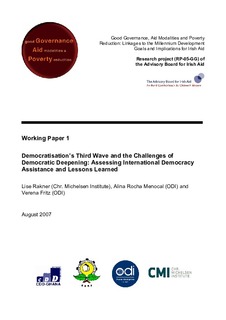| dc.contributor.author | Rakner, Lise | |
| dc.contributor.author | Menocal, Alina Rocha | |
| dc.contributor.author | Fritz, Verena | |
| dc.date.accessioned | 2018-01-04T08:15:29Z | |
| dc.date.available | 2018-01-04T08:15:29Z | |
| dc.date.issued | 2007-10-10 | |
| dc.identifier | oai:www.cmi.no:2761 | |
| dc.identifier.citation | London: Overseas Development Institute (ODI Working Papers no. 1) 62 p. | |
| dc.identifier.uri | http://hdl.handle.net/11250/2474500 | |
| dc.description.abstract | This study focuses on democratisation and democracy assistance in the developing world. It provides an overview of the democratisation processes that have swept across the developing world since the 1980s and explores some of the main challenges facing many of these incipient democratic regimes. Moving from theory to practice, the paper also analyses some of the most important forms of democracy assistance that donors have undertaken to support democratisation processes over the past two decades. The report is divided into four main chapters. Chapter 1 defines the parameters of this study and situates democratisation processes and democratisation support in the wider context of governance changes and donor policy choices. Democratisation evolved from a trickle into a wave in the developing world with the end of the Cold War. Democratisation assistance has become a substantial element in the development agenda of many donors, especially the US and a number of European bilateral agencies. Post 9/11, new challenges have emerged. While donors have been increasingly engaged in state-building and democratisation efforts in ‘fragile states', this report focuses on states in the developing world more generally and, hence, does not provide specific guidance on these more ‘extreme' environments. Chapter 2 reviews the academic literature on the Third Wave of democratisation and explores the specific democratisation trajectories found in African countries, namely democratic consolidation, democratic processes ‘stuck in transition' and ‘political meltdown'. The chapter covers fundamental conceptual debates about democratic transitions and the challenges of democratic consolidation. It analyses the emergence of ‘hybrid regimes' - political systems where a formal transition to democracy has taken place but where authoritarian practices and (informal) institutions continue to persist. Chapter 3 examines why and how donors | |
| dc.language.iso | eng | |
| dc.publisher | Overseas Development Institute | |
| dc.relation | ODI Working Papers | |
| dc.relation | 1 | |
| dc.relation.ispartof | ODI Working Papers | |
| dc.relation.ispartofseries | ODI Working Papers 1 | |
| dc.relation.uri | https://www.cmi.no/publications/2761-democratisations-third-wave-and-the-challenges-of | |
| dc.subject | Democratisation | |
| dc.subject | Democracy Assistance | |
| dc.subject | Development Agenda | |
| dc.subject | Bilateral Agencies | |
| dc.title | Democratisation's Third Wave and the Challenges of Democratic Deepening: Assessing International Democracy Assistance and Lessons Learned | |
| dc.type | Research report | |
